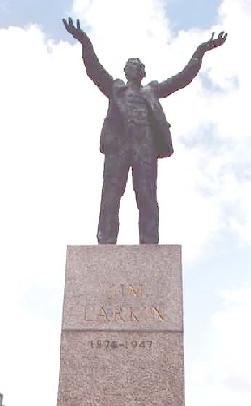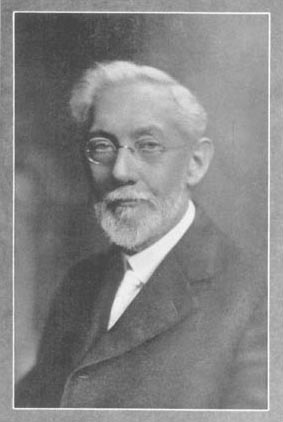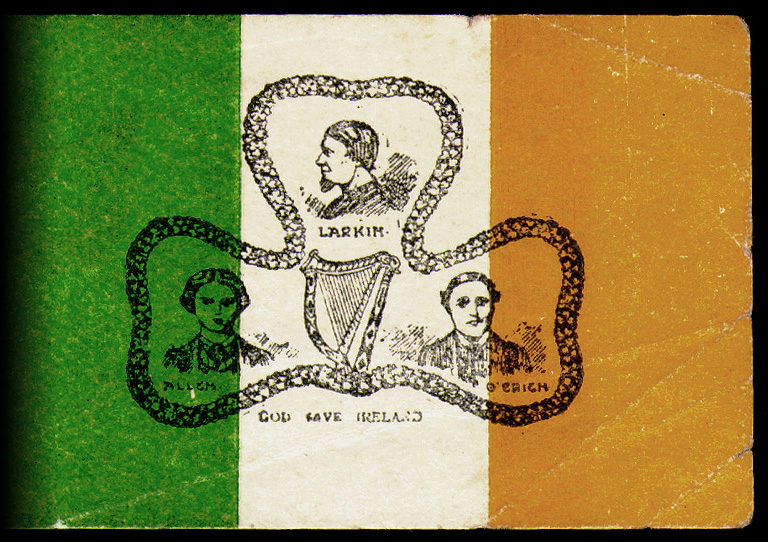Notable Historical Larkin's
Michael Larkin, the Manchester Martyr
One of the three Manchester Martyrs from the 1867 Fenian rebellion against British rule in Ireland. Three individuals, William Allen, Michael Larkin, and William O'Brien were hanged for their role in trying to free Fenian leader Thomas J. Kelly who was under arrest in Manchester, England. A policeman was killed in the attempt and the three were quickly hanged on November 23, 1867, despite the fact that none of the three had killed the policeman. Their mass funerals and events with the Land League focused the minds of the popular masses on the injustice of English rule in Ireland. Public outrage at the executions, as well as agitation for an amnesty for Fenian prisoners, succeeded in mobilizing nationalist opinion to an extent that the rising itself failed to achieve, and provided a basis for the launching of the home rule movement.
Below is an illustration of a popular symbol of their sacrifice for the cause of Irish freedom. It is thought this icon was used for pennants and stamps.
Michael Larkin's final words at the trial that would soon result in his death:
"I have only got a word or two to say concerning Sergeant Brett. As my friend here said, no one could regret the man's death as much as I do. With regard to the charge of pistols and revolvers, and my using them, I call my God as witness that I neither used pistols, revolvers, nor any instrument on that day that would deprive the life of a child, let alone a man. Nor did I go there on purpose to take life away. Certainly, my lords, I do not want to deny that I did go to give aid and assistance to those two noble heroes that were confined in that van--Kelly and Deasy. I did go to do as much as lay in my power to extricate them out of their bondage; but I did not go to take life, nor, my lord, did anyone else. It is a misfortune there was life taken; but if it was taken it was not done intentionally, and the man who has taken life we have not got him. I was at the scene of action, when there were over, I dare say, 150 people standing by there when I was. I am very sorry I have to say, my lord, but I thought I had some respectable people to come up as witnesses against me; but I am sorry to say as my friend said--I will make no more remarks concerning that. All I have to say, my lords and gentlemen, is that so far as my trial went, and the way it was conducted, I believe I have got a fair trial."
He evidently alluded to the exertions of his counsel and solicitor, whom he thanked. He concluded with a curiously fatalistic reference to his belief in the old saying, "what is decreed a man in the page of life he has to fulfil, either on the gallows, drowning, a fair death in bed, or on the battle-field."
"So I look to the mercy of God. May God forgive all who have sworn my life away. As I am a dying man, I forgive them from the bottom of my heart. God forgive them."
See the following links for further information.
- http://www.geocities.com/Athens/Aegean/7023/Irishnationalism.html
- http://www.rarebooks.nd.edu/digital/stamps/irish/set8L/set8L.html
- http://www.marxists.org/archive/connolly/1915/11/manmrtyr.htm
- Speaches of the Manchester Martyers
A number of folks have told me they didn't think our Sept was related to the Manchester Martyr (he was killed in England, after all). Those who know a bit more point out that he was from Offaly and not Tipperary or Galway. I disagree. If you look more closely at his birthplace, it is Lusmagh Parish, Co Offaly (aka King's County). That is on the far western flank of Offaly, right across the Brosna river from Lorrha and north Tipperary. Thus, I feel he is a distant cousin with a common ancestor probably around the year 1700.

|
Big Jim Larkin - Labor Leader |
|
|
James Big Jim Larkin is a very famous figure in Ireland and is considered one of the founders of the Irish labor movement. Jim was born in Liverpool, England of Irish parents, in 1874. His father, also named James, came from County Armagh but worked in Liverpool and died of tuberculosis when Jim was only 14 years old. Jim left school very early and worked many odd jobs, primarily as a day-laborer on the Liverpool docks. |
 |
|
|
Jim travelled to Ireland in 1907, as an organiser for the Liverpool-based National Union of Dock Labourers (NUDL) and eventually founded an Irish-based union, the ITGWU, in 1908. Larkin left Ireland after defeat in the 1913 lockout conflict and so was in America when the Easter Rebellion broke out against the British in Dublin in 1916. Larkin worked for communist movements during the World War One era but eventually returned to Ireland as an embattled figure. Through his many conflicts, he stood for the humble man and so today he is remembered with a large statue on the famous O'Connell Street in Dublin. There are several books and web pages written on Big Jim Larkin. |
||
3 Generations of Kilkenny Hurling Champions
Only two families can boast of having won the all-Ireland championship for hurling, the Donnellan's of Galway and the Larkin's of Kilkenny. Grandfather Paddy Larkin won 4 championships in the 1930s. Son Fan Larkin added another 5 championships in the 1960s and 1970s. Grandson Phillip Larkin won a new championship in 2000.
See http://www.hoganstand.com/general/past/feb/larkin.htm for a full write-up their story.
My understanding of the Larkin's of Kilkenny is that they are a different Sept with the same name. Hopefully DNA testing can be some day to determine how closely they are related to our group. The supposition based on the oral and written traditions of Ireland is that would not be near relatives (e.g. nearest common ancestor might be 1000 years)
There was also a 1958 / 59 Tipperary county Hurling all-star named T. Larkin
Poet Phillip Larkin

Phillip Larkin (1922-1985) was an English academic and librarian who wrote ascerbic poetry in the latter 1900s. There is no evidence of any Irish roots for this man and certainly his culturation was very English. A full biography of Phillip is available at http://en.wikipedia.org/wiki/Phillip_Larkin.
Religious Writer, Clarence Larkin

Clarence (1850-1924) was a religious scholar of considerable note who wrote study guides for the bible that are still used today. See http://www.larkinestate.com/larkinbio.htm for a full biography of the man.
Genealogically, he was from a long line of Larkin's in eastern Pennsylvania. Some attribute the line to England as Quaker immigrants of the 1600s. Others say the line came to Pennsylvania from Maryland and that the John Larkin, Inn Keeper in Anne Arundel County Maryland of 1644 is the progenitor of this line.
Singer Patty Larkin

Know for her red hair and great accomplishment as a folk guitarist, Patty is known throughout the world. She was born in Iowa to a musical family but raised primarily in Wisconsin. Born in Iowa, Larkin grew up in Milwaukee, in a family where music created generational bonds. Patty attended the University of Oregon where she earned a degree in English. She has not responded to inquiries to further ascertain her genealogical roots.
